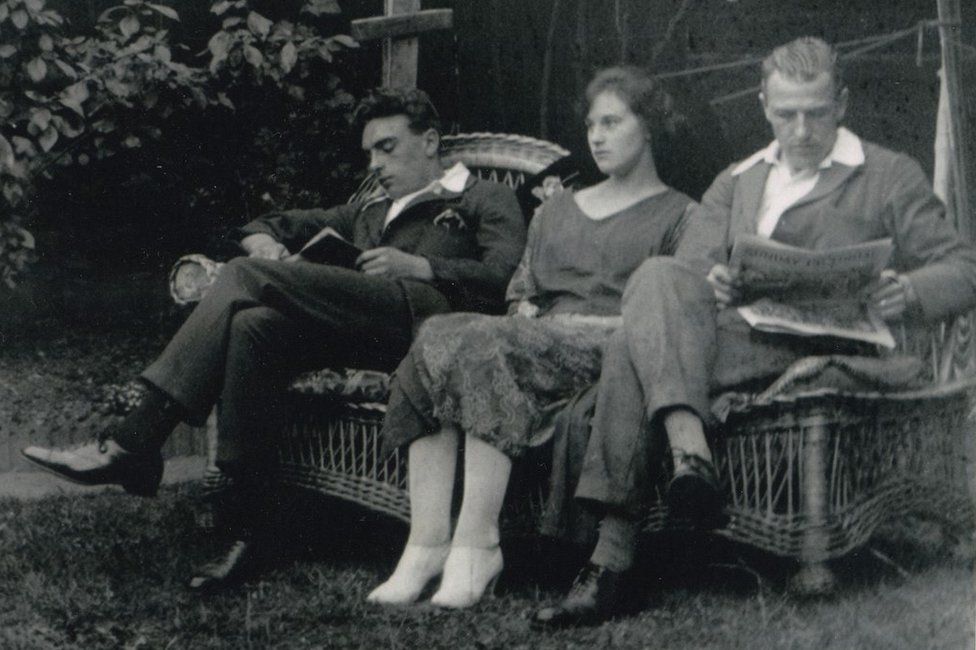Edith Thompson: Hanged woman's case denied pardon bid
- Published

The case of a woman hanged over 100 years ago for the murder of her husband does not meet the requirements for a royal pardon, a commission has ruled.
Edith Thompson, 29, was found guilty of murdering Percy Thompson after he was fatally stabbed by her lover Frederick Bywaters in east London in 1922.
The review panel found that while her trial may not now be considered fair, there was no new evidence available.
Edith Thompson's heir and executor said he was "looking at all options".
Edith and Percy Thompson, 32, were returning to their home in Ilford after a night at the theatre on 3 October 1922 when he was stabbed to death by 20-year-old Freddy.
While investigating the case, police discovered letters revealing an affair between Edith and her husband's killer, turning the case into a huge public sensation.
Despite there being little evidence against her and the insistence of Bywaters that she played no part in her husband's death, both were found guilty of murder and executed at separate London prisons on 9 January 1923.
Numerous publications and programmes have been made about it since with questions about the fairness of Edith's trial, particularly in the inclusion of her letters as evidence despite them having no connection to the murder, as well as the conduct of the judge who repeatedly interjected on the side of the prosecution.
The Criminal Cases Review Commission (CCRC) was asked to re-examine the case by then-justice secretary Dominic Raab following an application for a posthumous pardon by a firm of solicitors on behalf of Prof René Weis, Edith's heir and executor.
Releasing its findings nearly a year on, the CCRC concluded the case "is not made out for the granting of a royal pardon".
Setting out its reasons, the panel stated that while "by modern standards of fairness", the use of the letters as evidence "may have been ruled inadmissible by the trial court" and the judge's summing up "lacked fairness and impartiality", there was no "new evidence" to clear Edith Thompson.
The CCRC also found her case to not be "exceptional" enough, unlike that of codebreaker Dr Alan Turing who was posthumously granted a royal pardon in 2013 over his conviction for gross indecency despite there being no new evidence to clear him.
Explaining the difference between the cases, the panel said Turing's "moral innocence and significant wartime contribution" meant his pardon was "granted on grounds of exceptional factors", while the arguments involved in Edith's case were "not so extraordinary as to render hers... exceptional".
Reacting to the ruling, Prof Weis said he and his solicitors found the CCRC's conclusions "disappointing and surprising and [we] believe they are wrong".
"What is incomprehensible to me is that CCRC concedes that the trial may have been unfair but that nevertheless justice was done; that an unfair trial could generate a just guilty verdict," he said.
He added he believed the trial to be "exceptional" given the prejudice Edith faced from the judge and prosecution and the fact the case has been "contested more extensively and for longer, in legal and related studies, than any other historic miscarriage of justice" for a century.
Speaking about his next steps, Prof Weis told the BBC that while the ruling was "undoubtedly a setback... we will fight their decision" and "we will look at all options".
The CCRC has been approached for comment.
- Amongst the evidence considered to reach its conclusion, the commission said it had reviewed an episode of the BBC podcast Lady Killers with Lucy Worsley, which you can listen to on BBC Sounds
Listen to the best of BBC Radio London on Sounds and follow BBC London on Facebook, X and Instagram. Send your story ideas to [email protected]
- Published7 March 2023
- Published10 January 2023
- Published9 January 2023